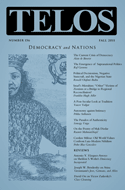Ronald Olufemi Badru’s “The Ontology of Political Decisionism, Negative Statecraft, and the Nigerian State: Exploring Moral Altruism in Politics” appears in Telos 156 (Fall 2011). Read the full version online at the TELOS Online website, or purchase a print copy of the issue here.
 This exercise in political philosophy adopts the research methods of conceptual analysis, extensive argumentation, and historical account. Using the theoretical framework of political decisionism, espoused by the German political philosopher Carl Schmitt, the essay attempts to explain the operation of the main actors within Nigeria’s political space. There are two central claims. First, Nigeria’s political leadership has detached morality from the political sphere; political leaders have covertly eroded the authority of both legal and moral norms in satisfying their egoistic interests. Second, the political class regards one another as enemies, leading to numerous incidents of political assassinations and killings among them. These claims aptly instantiate and summarize the Schmittian political decisionism in Nigeria’s politics. However, the paper concludes that since politics in the ideal is service to the public, for an all-round development, and the egoism of political decisionism resists this objective, then there ought to be a new morality of altruism in Nigeria’s politics. Committing to the welfare of the other, rather than that of the self, moral altruism ensures that politics is rightly conducted in Nigeria to achieve the well being of the general other, leading to an all-inclusive social development in the final analysis.
This exercise in political philosophy adopts the research methods of conceptual analysis, extensive argumentation, and historical account. Using the theoretical framework of political decisionism, espoused by the German political philosopher Carl Schmitt, the essay attempts to explain the operation of the main actors within Nigeria’s political space. There are two central claims. First, Nigeria’s political leadership has detached morality from the political sphere; political leaders have covertly eroded the authority of both legal and moral norms in satisfying their egoistic interests. Second, the political class regards one another as enemies, leading to numerous incidents of political assassinations and killings among them. These claims aptly instantiate and summarize the Schmittian political decisionism in Nigeria’s politics. However, the paper concludes that since politics in the ideal is service to the public, for an all-round development, and the egoism of political decisionism resists this objective, then there ought to be a new morality of altruism in Nigeria’s politics. Committing to the welfare of the other, rather than that of the self, moral altruism ensures that politics is rightly conducted in Nigeria to achieve the well being of the general other, leading to an all-inclusive social development in the final analysis.



